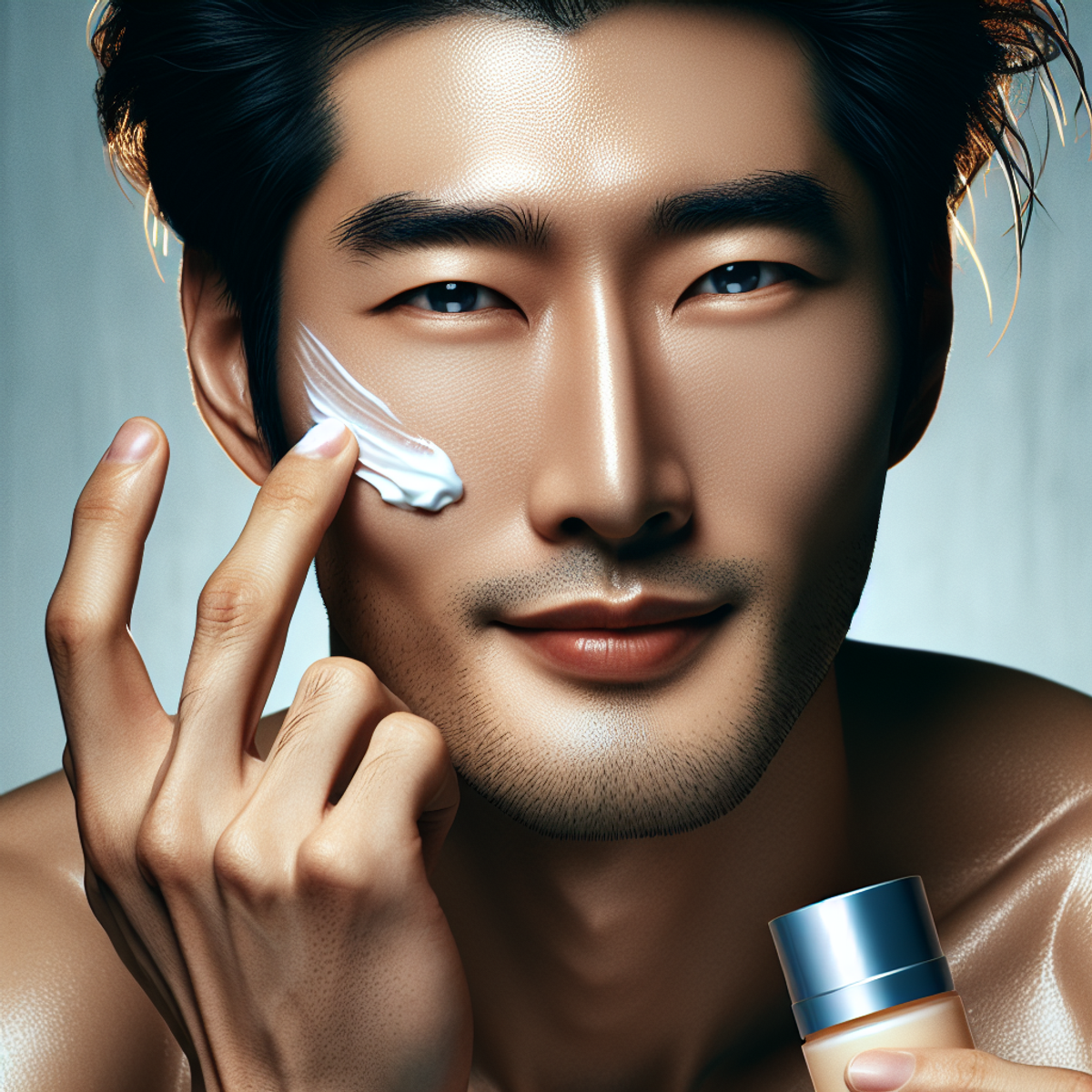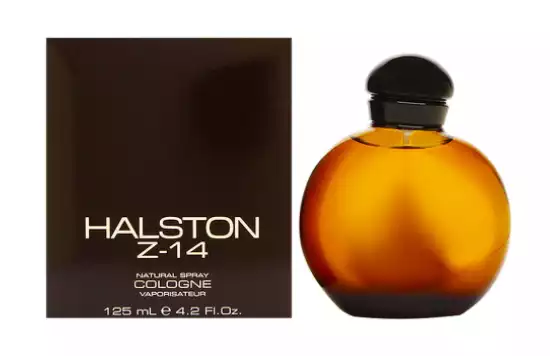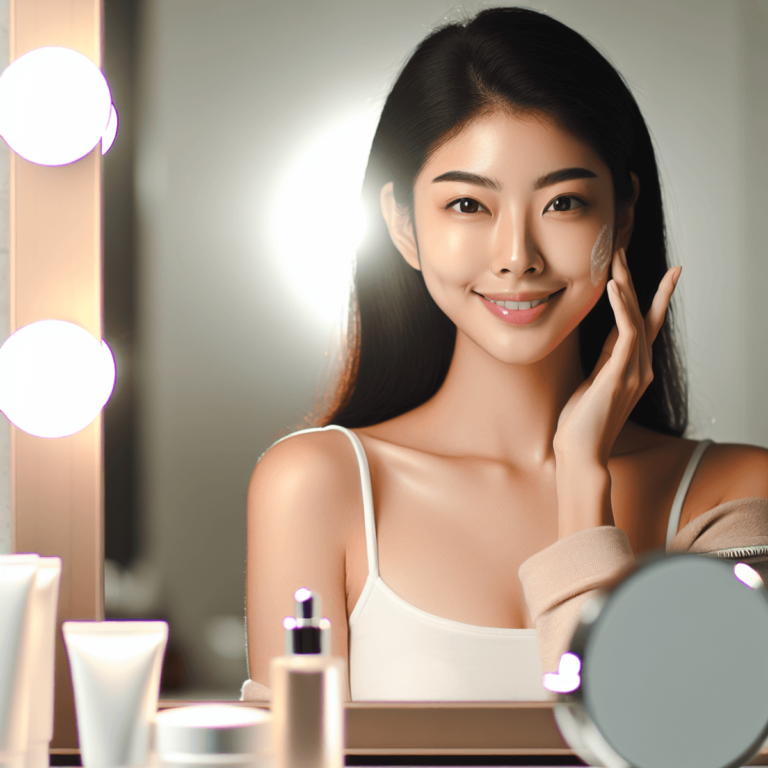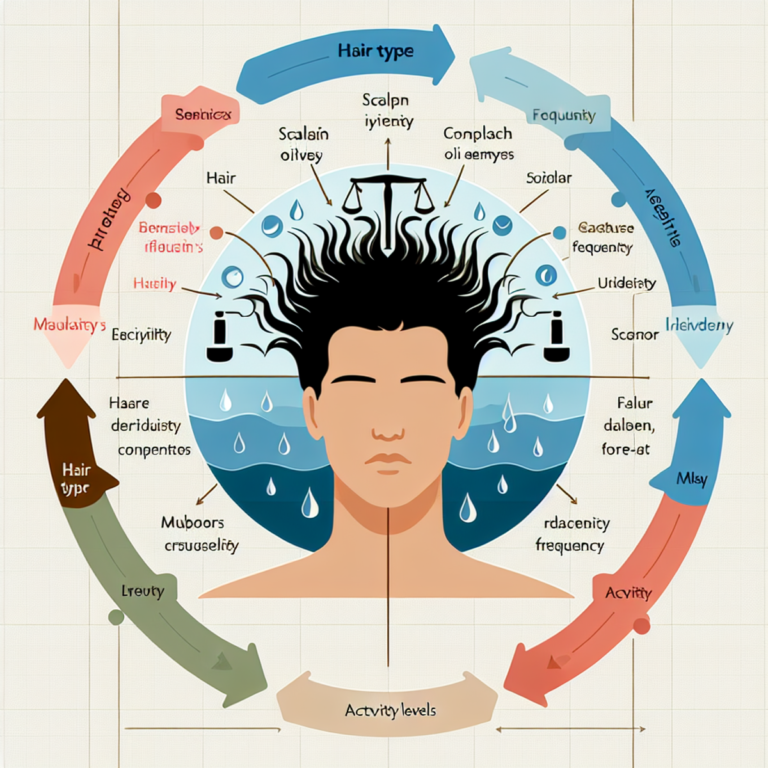The Grown Man’s Guide to Skincare: A Daily Routine for All Skin Types

Introduction
Skincare is often associated with women, but it’s important for men to prioritize their skincare routine as well. Taking care of your skin not only improves your appearance but also promotes overall health and well-being. In this article, we will discuss the importance of skincare for men and provide a comprehensive daily routine that is suitable for all skin types.
Understanding Your Skin Type
Knowing your skin type is crucial for developing an effective skincare routine. Different skin types have distinct characteristics and require specific care. Here are the main skin types and their corresponding skincare recommendations:
1. Normal Skin
- Characteristics: Normal skin is well-balanced, with a proper oil-water ratio. It has a smooth texture, small pores, and no visible blemishes. This skin type rarely experiences sensitivity or dryness.
- Skincare Recommendations: Lucky you! Normal skin requires minimal maintenance. To keep it healthy:
- Use a gentle cleanser twice daily to remove dirt and impurities.
- Moisturize regularly to maintain hydration.
- Apply a broad-spectrum sunscreen with at least SPF 30 every day to protect against UV damage.
2. Oily Skin
- Characteristics: Oily skin produces excess sebum, resulting in a shiny appearance, enlarged pores, and a tendency for acne breakouts. It may also be prone to blackheads and whiteheads.
- Skincare Recommendations: Managing oily skin involves balancing oil production without stripping the skin of its natural moisture.
- Cleanse with a gentle foaming or gel cleanser to remove excess oil without over-drying.
- Use oil-free or non-comedogenic moisturizers to hydrate the skin without clogging pores.
- Incorporate products with ingredients like salicylic acid or benzoyl peroxide to control acne breakouts.
3. Dry Skin
- Characteristics: Dry skin lacks moisture and tends to feel tight, rough, or flaky. It may appear dull, have fine lines, and be more prone to irritation.
- Skincare Recommendations: Nourishing and hydrating dry skin is essential to restore its moisture balance.
- Opt for creamy or oil-based cleansers that won’t strip away natural oils.
- Use moisturizers enriched with ingredients like hyaluronic acid and ceramides to lock in hydration.
- Avoid hot showers or baths, as they can further dry out the skin. Instead, opt for lukewarm water.
4. Combination Skin
- Characteristics: Combination skin is a mix of oily and dry areas. The T-zone (forehead, nose, and chin) tends to be oilier, while the cheeks are drier.
- Skincare Recommendations: Balancing combination skin involves addressing both oily and dry areas.
- Cleanse with a mild cleanser that won’t overly dry out the skin.
- Use lightweight moisturizers on the oily T-zone to avoid excessive oiliness.
- Apply more hydrating products on the drier areas, such as the cheeks.
5. Sensitive Skin
- Characteristics: Sensitive skin is easily irritated, leading to redness, itching, or burning sensations. It may react negatively to certain skincare products or environmental factors.
- Skincare Recommendations: Gentle care is crucial for sensitive skin to minimize irritation.
- Choose fragrance-free and hypoallergenic products specifically formulated for sensitive skin.
- Patch test new products before applying them to your entire face.
- Use [sunscreen with physical blockers](https://www
Building Your Daily Skincare Regimen: Essential Steps for All Men
When it comes to skincare, establishing a daily regimen is crucial for maintaining healthy and nourished skin. A consistent routine not only helps to address specific skin concerns but also provides a foundation for overall skin health. In this section, we will explore the essential steps that all men should incorporate into their daily skincare regimen.
1. Cleansing
Cleansing is the first and most important step in any skincare routine. It helps to remove impurities, excess oil, and dirt from the skin’s surface, allowing other skincare products to penetrate effectively. When choosing a cleanser, it’s essential to consider your skin type:
- Normal Skin: If you have normal skin that is neither too oily nor too dry, you can opt for a gentle cleanser that effectively cleanses without stripping away natural oils.
- Oily Skin: For those with oily skin, a foaming or gel-based cleanser can help to control excess oil production and leave the skin feeling fresh.
- Dry Skin: If you have dry skin, look for a hydrating cleanser that doesn’t strip away moisture. Cream or lotion-based cleansers are ideal for this skin type.
- Combination Skin: Combination skin requires a balancing act. Choose a cleanser that targets both oily and dry areas without causing further imbalance.
- Sensitive Skin: Sensitive skin needs extra care and attention. Opt for a fragrance-free and hypoallergenic cleanser that is gentle on the skin.
Remember to cleanse your face twice a day – once in the morning and once in the evening – to maintain clean and healthy skin.
Pro Tip: When cleansing your face, use lukewarm water instead of hot water as hot water can strip away natural oils and cause dryness.
2. Exfoliation
Exfoliation is an important step to include in your skincare routine as it helps to remove dead skin cells, unclog pores, and improve skin texture. There are two types of exfoliation methods: physical and chemical.
- Physical Exfoliation: Physical exfoliators involve using a scrub or brush to manually slough off dead skin cells. Look for exfoliating products with gentle granules or brushes with soft bristles to avoid irritation.
- Chemical Exfoliation: Chemical exfoliators contain ingredients such as alpha-hydroxy acids (AHAs) or beta-hydroxy acids (BHAs) that dissolve dead skin cells. These products are especially beneficial for those with sensitive skin or acne-prone skin.
When choosing an exfoliator, consider your skin type and sensitivity level. It’s important not to over-exfoliate, as this can lead to skin irritation and damage. Aim to exfoliate 1-2 times per week for optimal results.
Pro Tip: After exfoliating, always follow up with a moisturizer to replenish the skin’s hydration levels.
3. Toning
Toning is a step that
2. Exfoliation
Exfoliation is an important part of taking care of your skin. It involves removing dead skin cells to reveal a smoother and brighter complexion. By exfoliating regularly, you can:
- Unclog pores: Exfoliation helps to get rid of dirt, oil, and other impurities that can build up in your pores and lead to acne breakouts.
- Improve skin texture: By getting rid of dead skin cells, exfoliation promotes the growth of new, healthy skin cells. This can make your skin feel softer and look more even.
- Enhance product absorption: When you exfoliate, you’re essentially creating a clean canvas for your skincare products to work on. Without the barrier of dead skin cells, your moisturizers, serums, and other treatments can penetrate deeper into your skin and deliver better results.
Different Methods of Exfoliation: Physical vs. Chemical, and How to Choose the Right One for You
There are two main ways to exfoliate: physically or chemically. Here’s what you need to know about each method:
1. Physical Exfoliation
Physical exfoliation involves using a scrub or tool to manually remove dead skin cells from the surface of your skin. This can be done with:
- Face scrubs: These products contain small particles like sugar or jojoba beads that you massage onto your skin to slough off dead cells.
- Exfoliating brushes or devices: These tools have bristles or heads that you use in combination with your cleanser to buff away dead skin.
Physical exfoliation can be satisfying and give you immediate results, but it’s important to be gentle. Using too much pressure or harsh ingredients can irritate your skin.
2. Chemical Exfoliation
Chemical exfoliation involves using acids or enzymes to dissolve the bonds between dead skin cells, making them easier to remove. This method is often gentler and more suitable for sensitive skin. Some common types of chemical exfoliants include:
- Alpha hydroxy acids (AHAs): These water-soluble acids, such as glycolic acid and lactic acid, are great for brightening the complexion and improving skin texture.
- Beta hydroxy acid (BHA): This oil-soluble acid, also known as salicylic acid, is effective in treating acne-prone and oily skin. It can penetrate deep into your pores to unclog them and reduce inflammation.
- Enzymes: Natural exfoliants like papain (from papaya) and bromelain (from pineapple) gently dissolve dead skin cells without causing irritation. They’re a good option for sensitive or dry skin.
When choosing an exfoliant, consider your skin type and sensitivity level:
- If you have sensitive or dry skin, opt for a gentle chemical exfoliant or a mild physical exfoliant.
- If you have oily or acne-prone skin, a stronger chemical exfoliant or a physical exfoliant with finer particles may be more effective.
Remember to start with a lower concentration or frequency of exfoliation and gradually increase as your skin adjusts.
Conclusion
Exfoliation can do wonders for your skin, but it’s important to do it right. Here are some key takeaways:
- Exfoliate regularly to remove dead skin cells, unclog pores, and improve skin texture.
- Choose the right method of exfoliation for your skin type: physical or chemical.
- Be gentle when exfoliating to avoid irritation or damage.
- Always follow up with moisturizer and sunscreen after exfoliating to protect your newly revealed skin.
So go ahead and give your skin the gentle yet effective treatment it deserves!
3. Toning
When it comes to your daily skincare routine, toning plays a crucial role in maintaining balanced and healthy skin. Here’s what you need to know about toners and their significance in your skincare regimen.
Purpose and Benefits of Toning
Toning is an essential step that helps restore your skin’s natural pH balance, which can be disrupted after cleansing. It also removes any remaining impurities or traces of makeup, preparing your skin for the subsequent products in your routine. By tightening the skin and minimizing the appearance of pores, toners create a smooth canvas for serums and moisturizers.
Exploring Different Types of Toners
There are various types of toners available, each catering to specific skin concerns and types. Some common categories include:
- Hydrating Toners: Infused with ingredients like hyaluronic acid, these toners provide an extra boost of hydration, making them ideal for dry or dehydrated skin.
- Exfoliating Toners: Formulated with gentle exfoliating agents such as AHAs or BHAs, these toners help slough off dead skin cells and promote cell turnover, revealing brighter and smoother skin.
- Balancing Toners: Designed to soothe and balance the skin, these toners are suitable for individuals with combination or oily skin, helping control excess oil production without stripping the skin of its natural moisture.
Understanding the specific effects of different toners will allow you to choose the most suitable option for your unique skincare needs.
Incorporating a high-quality toner into your daily regimen can make a noticeable difference in the overall health and appearance of your skin. As you continue to build your skincare routine, keep in mind that consistency is key. By diligently following each step – from cleansing to toning and beyond – you’ll set the foundation for vibrant and resilient skin.
4. Serum Application
When it comes to achieving healthy and radiant skin, incorporating a serum into your daily skincare routine can make a significant difference. Serums are highly concentrated formulations designed to penetrate deeply into the skin, delivering active ingredients that target specific concerns. This makes them potent allies in addressing various skin issues, from hydration and brightening to anti-aging and blemish control.
Why Serums Are Potent Allies in Targeting Skin Issues
- Highly Concentrated Formulas: Serums contain a high concentration of active ingredients, such as vitamins, antioxidants, and peptides. This allows for more effective and targeted treatment of specific skin concerns.
- Deep Penetration: The lightweight consistency of serums enables them to penetrate deeply into the skin, delivering potent actives directly to the cellular level where they can have the most impact.
- Versatility: There are serums available to address a wide range of skincare needs, including hydration, brightening, firming, and soothing. This versatility makes it easier to customize your skincare routine based on your individual concerns.
- Layering Compatibility: Serums can be easily layered with other skincare products without feeling heavy or greasy on the skin. This means you can tailor your regimen by combining different serums to address multiple concerns simultaneously.
Key Considerations for Selecting an Effective Serum for Your Concerns
- Identify Your Skin Concerns: Before choosing a serum, it’s essential to identify your specific skin concerns, whether it’s fine lines and wrinkles, hyperpigmentation, dryness, or acne.
- Active Ingredients: Look for serums that contain active ingredients known for addressing your particular skin issues. For example:
- Vitamin C: Ideal for brightening dull skin and combating dark spots.
- Hyaluronic Acid: Excellent for boosting hydration and plumping the skin.
- Retinol: Effective in reducing the appearance of fine lines and wrinkles.
- Niacinamide: Known for controlling oil production and minimizing pore size.
- Skin Compatibility: Consider your skin type when selecting a serum. For oily or acne-prone skin, opt for lightweight, oil-free serums, while dry or sensitive skin may benefit from richer, more hydrating formulations.
- Product Quality: Choose serums from reputable skincare brands known for their quality and use of effective concentrations of active ingredients.
- Consistency in Usage: To see noticeable results from using a serum, consistency is key. Incorporate it into your daily morning or evening skincare routine to reap the full benefits over time.
The strategic inclusion of a serum in your daily regimen can elevate your skincare routine by specifically targeting and addressing individual skin concerns with potent and effective formulations. By understanding the key considerations when choosing a serum tailored to your needs, you can optimize its benefits as part of your overall skincare regimen.
5. Moisturizing
Skincare products are essential for keeping your skin healthy and glowing, and one of the most important steps in your daily routine is moisturizing. This step is crucial for hydrating and nourishing your skin’s protective barrier, no matter what type of skin you have. Here are some important things to know about moisturizing:
1. Hydration and Nourishment
Moisturizers are specifically formulated to give your skin the hydration it needs, helping it maintain its natural moisture balance. They also contain nourishing ingredients that support the health and vitality of your skin.
2. Protecting Your Skin
Your skin’s protective barrier acts as a shield against environmental factors that can harm it, like pollution and UV rays. It also helps trap moisture in your skin, keeping it hydrated throughout the day. Using a moisturizer regularly strengthens this barrier, reducing the risk of problems like dryness, sensitivity, and premature aging.
3. Considering Your Skin Type
Different skin types have different levels of moisture naturally present in them. For example:
- People with dry skin may benefit from using thicker, more moisturizing creams.
- Those with oily or combination skin might prefer lighter, non-greasy lotions that won’t clog their pores.
Understanding your skin type can help you choose a moisturizer that caters to its specific needs.
4. Making It a Habit
It’s important to make moisturizing a part of your daily skincare routine to ensure consistent care for your skin. This not only keeps your skin healthy overall but also allows you to target specific concerns over time.
When looking for the perfect moisturizer for your skin type, keep these factors in mind:
- Texture: Decide whether you prefer a cream, lotion, gel, or oil-based product based on your personal preference and how it feels on your skin.
- Ingredients: Look for key ingredients like hyaluronic acid, glycerin, or ceramides that are known for their moisturizing properties.
- Specific Concerns: If you have any specific skin concerns like acne or aging, look for moisturizers that address those issues as well.
It’s also important to choose a moisturizer that works well with the other products in your skincare routine. This ensures that all the steps are working together effectively to give you the best results.
6. Face Masks
When it comes to enhancing your skincare routine, face masks are a valuable addition that can provide various benefits for your skin. Incorporating face masks into your weekly skincare regimen can help address specific skin concerns and promote overall skin health.
Enhancing Your Skincare Routine with the Benefits of Face Masks
- Deep Cleansing: Face masks, particularly clay masks, are effective in drawing out impurities and excess oils from the skin, helping to unclog pores and prevent breakouts.
- Hydration and Nourishment: Sheet masks infused with hydrating ingredients such as hyaluronic acid or aloe vera can deeply moisturize the skin, leaving it soft, supple, and revitalized.
- Targeted Treatment: Certain face masks are formulated to target specific concerns such as acne, dullness, or uneven skin tone, providing a concentrated treatment for noticeable improvements. It’s important to choose the best face mask for your skin type to maximize results.
- Relaxation and Self-Care: Applying a face mask can also be a relaxing ritual that allows you to take some time for self-care and pampering, promoting mental well-being alongside skincare benefits.
Different Types of Face Masks for Various Purposes
- Sheet Masks: These are pre-soaked fabric masks that come in individual packets. They are convenient to use and are excellent for providing intense hydration and brightening effects.
- Clay Masks: Ideal for oily or acne-prone skin, clay masks work by absorbing excess oil and impurities from the skin. They can help refine the skin’s texture and minimize the appearance of pores.
- Cream Masks: These rich, creamy masks are great for providing deep nourishment and moisture to the skin. They are suitable for dry or mature skin types.
- Gel Masks: Gel-based masks are lightweight and refreshing, making them perfect for soothing and cooling the skin. They are beneficial for calming sensitive or irritated skin.
By incorporating face masks into your skincare routine 1-2 times per week, you can enjoy the unique benefits they offer while maintaining healthy and radiant-looking skin.
Remember to choose face masks that align with your specific skin type and concerns, as mentioned in this best face masks review, to maximize their effectiveness within your overall skincare regimen.
Taking It a Step Further: Additional Skincare Considerations
When it comes to enhancing your skincare routine and addressing specific skin concerns, there are additional factors to consider beyond the basic daily regimen. Understanding the role of active ingredients in skincare products, knowing when to seek professional guidance for advanced skincare needs, and familiarizing yourself with the different types of treatments available from skincare professionals can take your skincare journey to the next level.
The Role of Active Ingredients in Skincare Products and How to Identify Them on Labels
Active ingredients are the powerhouse components in skincare products that directly target particular skin issues or provide specific benefits. Whether you’re looking to combat signs of aging, reduce hyperpigmentation, or address acne concerns, understanding active ingredients is crucial for selecting the right products for your skincare routine. Some common active ingredients and their benefits include:
- Retinoids: Known for their anti-aging properties and ability to promote skin cell turnover.
- Vitamin C: A potent antioxidant that brightens the skin and protects it from environmental damage.
- Hyaluronic Acid: Ideal for hydrating and plumping the skin, making it appear more youthful.
- Salicylic Acid: Effective in treating acne by unclogging pores and reducing inflammation.
To identify active ingredients on product labels, look for key terms such as “retinol,” “ascorbic acid” (a form of vitamin C), “hyaluronic acid,” and “salicylic acid.” These ingredients are typically listed among the top few entries on a product label, indicating their higher concentrations in the formulation.
Knowing When to Seek Professional Guidance for Advanced Skincare Needs
While a regular skincare routine can work wonders for many individuals, some skin concerns may require expert attention. If you’re experiencing persistent acne, unusual rashes, excessive dryness, or any other challenging skin issues, it’s advisable to consult a skincare professional. Dermatologists and estheticians are trained to assess and address a wide range of skin conditions, providing personalized recommendations and treatments tailored to your specific needs.
Understanding the Different Types of Treatments Available from Skincare Professionals
Skincare professionals offer an array of advanced treatments that can complement your at-home skincare routine. These treatments may include:
- Chemical Peels: Utilizing various acids to exfoliate the skin and improve its texture and tone.
- Microdermabrasion: A non-invasive exfoliation procedure that helps reduce fine lines, sun damage, and minor scars.
- Laser Therapy: Targeting specific skin concerns such as pigmentation irregularities or unwanted hair growth.
- Microneedling: Stimulating collagen production through tiny needle pricks, leading to improved skin texture and firmness.
These professional treatments can address concerns that may be challenging to manage with over-the-counter products alone. However, it’s important to consult with a skincare professional to determine which treatment is most suitable for your individual needs.
By delving into these additional skincare considerations, you can elevate your skincare knowledge and approach. Understanding active ingredients empowers you to make informed choices about the products you use while recognizing when professional guidance is necessary ensures comprehensive care for your skin. Exploring advanced treatments available from skincare professionals opens up a world of possibilities for addressing specific concerns and achieving optimal skin health.
Conclusion
It’s time to take charge of your skincare routine and prioritize the health and wellness of your skin. By following a daily skincare regimen tailored to your skin type, you can achieve a complexion that looks and feels its best. Remember, consistency is key when it comes to skincare, so make it a habit to follow these steps every day.
Here are some final takeaways to keep in mind:
- Know Your Skin Type: Understanding your skin type is crucial for selecting the right products and addressing specific concerns. Whether you have normal, oily, dry, combination, or sensitive skin, there are skincare solutions available for you.
- Choose Products with Active Ingredients: Look for skincare products that contain active ingredients proven to target specific skin issues. Whether it’s vitamin C for brightening, retinol for anti-aging, or antioxidants for protection, these ingredients can make a significant difference in your skincare routine.
- Read Product Labels: Take the time to read product labels carefully. Look for the active ingredients, expiration dates, and usage instructions. This will ensure that you are using the product correctly and maximizing its benefits.
- Consider Professional Guidance: If you have serious skin concerns or are unsure about what products to use, don’t hesitate to seek advice from a skincare professional. Dermatologists and estheticians can provide personalized recommendations and treatments tailored to your specific needs.
- Maintain a Consistent Routine: Consistency is key when it comes to skincare. Make it a habit to cleanse, exfoliate, tone, apply serum, moisturize, and use face masks regularly. This will help keep your skin healthy and glowing.
- Self-Care Matters: Taking care of your skin is an act of self-care. It’s not just about achieving great-looking skin; it’s also about taking time for yourself and nurturing your overall well-being.
Remember that everyone’s skin is unique, and what works for one person may not work for another. Don’t be afraid to experiment and find the products and routine that work best for you. Skincare is a journey, and it’s important to listen to your skin’s needs as they may change over time.
So, gentlemen, it’s time to put your best face forward. Embrace the power of a daily skincare routine and give your skin the attention it deserves. With the right products and consistent care, you can achieve healthy, radiant skin that will make you feel confident and ready to take on the world.
Take charge of your skincare routine today and unlock the potential of your skin. Your future self will thank you!










